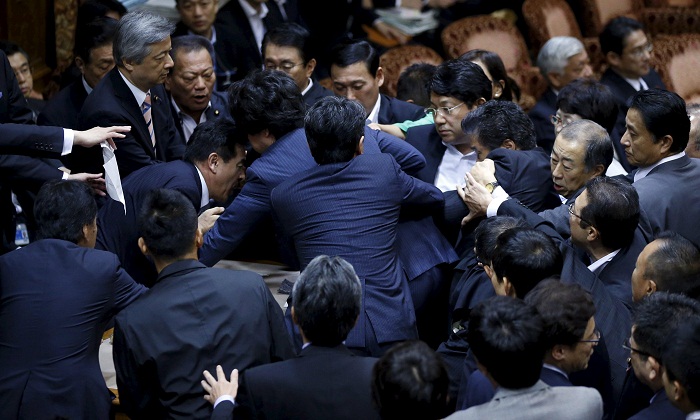Tensions fan high after the committee vote was repeatedly delayed over Wednesday night, as opposition MPs blocked doorways and packed the corridors of parliament in protest.
Thirteen people were also reportedly arrested during the evening for “interfering with officers” during a rally of an estimated 13,000 people outside parliament in Tokyo.
Tens of thousands of people have taken to the streets to vent their anger during almost daily rallies over the past weeks, a show of public feeling on a scale rarely seen in Japan.
Under the planned changes, the military – known as the self-defence forces – would have the option of going into battle to protect allies such as the United States even if there was no direct threat to Japan or its people.
Although the constitution, which bars troops from taking part in combat except in pure self-defence, was imposed by US occupiers, many Japanese feel strongly a change in the law would alter the country’s pacifist character.
The bills are scheduled to be sent to a plenary session of the upper house after being voted on by the committee, potentially seeing them become law this week.
The prime minister, Shinzo Abe, is keen to get the bills passed before a three-day holiday next week.
The proposed legislation sailed through the lower house – where Abe’s coalition has a two-thirds majority – in July.
Parliamentary rules say if the upper chamber does not pass the bills within 60 days, they can be returned to the lower house and voted into law.
Abe is reportedly ready to take this step, despite the risk of further angering an already hostile public.
There are growing signs the bills have taken a toll on Abe’s once high popularity. Opinion polls show most voters oppose them.
Many legal scholars have said the changes are unconstitutional, and critics worry they would drag Japan into US wars in far-flung parts of the globe.
Abe and his supporters say the bills are necessary to deal with a changing security environment marked by an increasingly assertive China and unpredictable North Korea.
More about:
















































